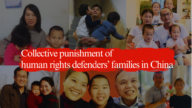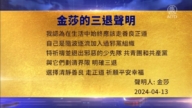【新唐人2011年10月5日讯】近几年,中国发生的许多重大安全疏失和贪污事件,经过网民在微博的迅速传递,短时间就可以传遍各地,让做坏事的人几乎是无所遁形。最近,有网民整理出几起著名的网络公共事件,编成了顺口溜来讽刺这些官员们。
最近,在微博流行的“官场新十大警示”,每项“警示”背后,其实都是著名网路公共事件的影子。如,接受采访不讲胡话;开会发言不抽名烟;商务应酬不戴名表;公务活动不开名车;基层视察不打雨伞;发表大作不抄名文; 与人约会不发微博;寻花问柳不写日记;灾难发生不露笑容;突发事件不当新闻发言人。
过去两年发生的重大事件,例如钱云会事件、李刚事件、郭美美事件、还有引人关注的温州动车追尾事件,这些都显示了微博巨大的威力。特别是动车事件,网民在微博上对细节的质问,迫使当局做出反应。
人物博报总编王松兴:“这几年很多贪官,所谓很多地方的政府官员,他们很多不检点的行为,网络就像一面镜子一样,每个人的为人处事,还有各种行为方式,都应该想想,这么多的网民都在关注着。”
学者认为,网络微博的兴起,一则喜一则忧,喜的是太阳底下没有什么可掩饰的,忧的是这5亿互联网用户的另一端,控制权还是在中共。不过,《瞭望》新闻周刊发表评论文章,有官员认为,不少基层干部依然用对待传统媒体的心态和方式来对待具有高度开放、互动、参与的新兴舆论场,必然会在新媒体舆论场的“暴风骤雨”中败下阵来。
宪政学者陈永苗:“原来的地方政府,他实际上他的讯息来自对本地区的事物都可以控制的。他的习惯是,当他可以控制的住的话,能够压抑的住的话,他觉得是个安全的,当包括网络舆论出现的时候,他发现网络的力量超出他的控制的范围,那么他就立即陷入一种恐慌当中。”
中共互联网信息办公室9月29号公布的最新资料,大陆互联网用户已经突破5亿,互联网普及率接近40%,约有一半以上的中国网民通过社交网路沟通交流,分享信息。
《瞭望》引述互联网管理部门官员,接受媒体采访时的话说:“对互联网存在不同程度的畏惧与畏难心理,是当前干部群体中较为突出的问题。”
宪政学者陈永苗:“我好几年前说,网络媒体是一个虚拟的天安门广场,之所以今天的微博能存在中国政治中起到有一点作用,主要是还是取决于中央政府想利用微博来控制地方政府,那现在的微博或者是网络媒体,实际上是中央政府来咬出地方政府的一条狗。如果哪天中央政府觉得重大危机来了,就看看你说的,就是所有物资条件、设备条件,都掌握在中央政府手上,他把你的线拔掉,你所有的网络都没了。”
《南方日报》稍早前报导,“官本位”的思想,让大陆许多无能的贪官们认为,贪赃枉法只要表面隐藏好,就可以高枕无忧。事实上,当事情发生,网路舆论持续不断的追责,网民们看不到真相不罢休的力量,这已经不是官方媒体单方面避重就轻就可以交代过去的。
新唐人记者张丽娜、黄容、薛莉采访报导。
Ten New Warnings Regarding China’s Bureaucracy
In recent years, China has faced many major trials concerning security breaches and corruption. News of such events spread like wildfire on the internet. People who do bad things are finding it harder to hide. Recently, some Internet users compiled information on several well-known public events and turned them into doggerel, to poke fun at the local officials.
http://bbs.city.tianya.cn/tianyacity/content/47/1/1302046.shtml
Recently, behind the popular Sina Microblog, Ten New Warnings of the Chinese Bureaucracy, each warning reflects those notorious events seen from public websites.
For instance, don’t talk nonsense while doing an interview; don’t smoke expensive cigarettes at a business meeting; don’t wear a luxury watch while socializing with businessmen; don’t drive a luxury car while on official business; don’t hold up an umbrella while having grass-root inspections; don’t be a copycat when writing an article; don’t Twitter through Sina Microblog while dating; don’t keep a diary while dilly-dallying with prostitutes; don’t smile when disaster strikes, and don’t be a news spokesman when unexpected events occur.
The dramatic events that have taken place in China over the past two years, have demonstrated the tremendous power of the Sina Microblog, like the Qian Yun-hui event, the Li-gang event, the Kuo Mei-mei event, and the most publicized event so far, the bullet train collision in east China’s Zhejiang Province. The authorities there were forced to quickly respond after bloggers questioned them about specific details of the collision.
Figure Blog editor, Wang Songxing: “In recent years, there are corrupt Chinese Communist Party (CCP) officials, or so-called ‘government officials,’everywhere you look. Many of them busy themselves with a variety of profligate behaviors. A website is like a mirror which reflects everyone’s behavior. Everyone should think before they leap because there are so many Internet users who are concerned about everything that is happening in the world.
Scholars believe that microblogging networks are on the rise, which is like two sides of a coin. The good thing about these networks is that there is nothing to hide under the sun on the Internet. The bad thing is that the CCP still controls 500 million Internet users. However, one commentary published in the Outlook Newsweek, said that some officials have argued that many grass-roots CCP cadres still treat the highly open, interactive, involving Internet public opinion site as the traditional media. The latter would surely be defeated in the “storm” of the new media.
Chen Yong-miao, a Constitutional scholar: “Local government officials think that they can control everything. They feel most secure when they’re able to control or suppress public opinion. But they will quickly panic when they realize that public opinion on the Internet is beyond their control.
http://www.hellotw.com/dlxw/zhqt/201109/t20110929_686551.htm
According to new statistics released by the Chinese Internet Information Office on Sept. 29, Chinese mainland Internet users have exceeded 500 million. Internet penetration rate is close to 40%. About half of Chinese Internet users share their information via social networking.
http://news.cn.yahoo.com/ypen/20111003/620750.html
During a media interview, Outlook Newsweek citied Internet management officials as saying: “The biggest problem the current group of cadres is now facing is that they have various degrees of fear and depression when coming face-to-face with the Internet.
Chen Yong-miao, a Constitutional scholar: “I said several years ago that online media is like a virtual Tiananmen Square. The reason why Sino Microblog can play a little role in Chinese politics is mainly becauase the central government’s attempt to control over local government. As a matter of fact, Sino Microblog and other Internet medias, are like biting dogs released by the central government. Since all material and equipment is in the CCP’s hands, they can pull out your line if a big crisis occurs. They will simply shut down your Internet.”
Nanfang Daily had recently reported that the thought of “official-oriented” makes many incompetent corrupt officials sit back and relax, as long as they can hide their corruption. In fact, when controversial events occur, Internet bloggers keep searching for the truth. This is not the evasive response from the government media can cover.
NTD reporters Zhang Li Na, Huang Rong and Xue Li

























